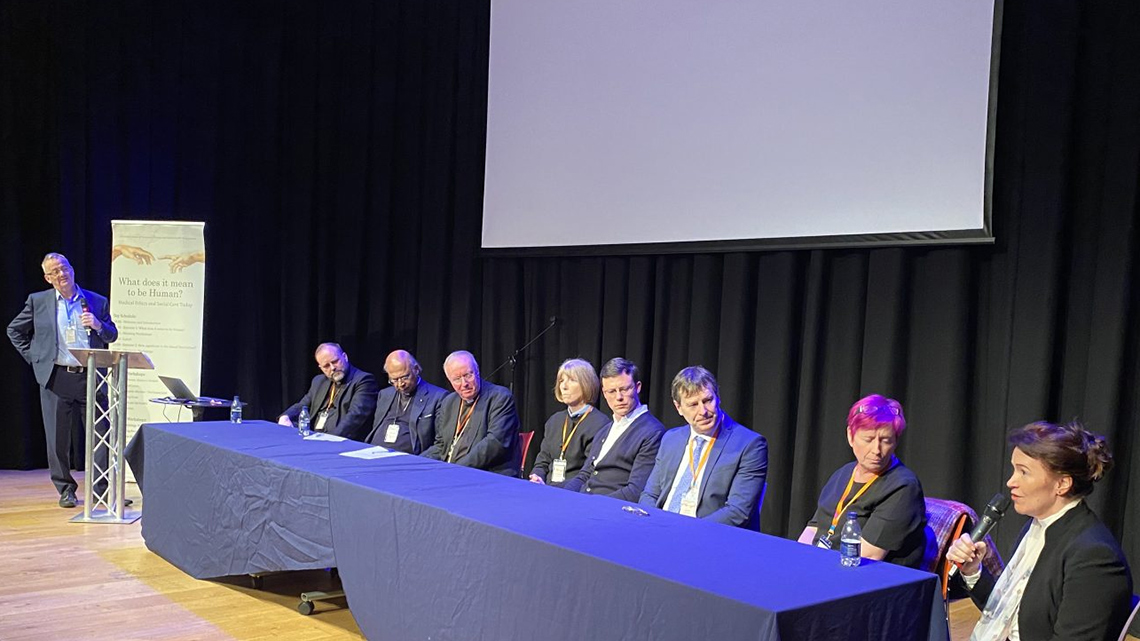
Over 100 people from around the country packed into the auditorium of Winchester Arc Centre last Saturday, 23 March, for the Catholic Diocese of Portsmouth’s What does it mean to be Human? event, a one-day Symposium attempting to tackle long-standing and controversial questions in modern medical ethics and social care.
Over the course of the day, the legal, medical, moral and religious aspects of holistic patient care from conception to end of life were discussed and debated in a series of thought-provoking keynote addresses, workshops and panel discussions.
In his introduction to the Symposium, the Bishop of Portsmouth, Bishop Philip Egan remarked: “The point of today’s Symposium is to help turn moral strangers into ‘moral friends’. We hope to get everyone – irrespective of their religious beliefs – talking to each other with respect and appreciation. We hope to grow in understanding of one another, where people are coming from, and even to learn from one another. Like learning a foreign language, how can express what we believe in another language? Can we learn from it? Can we even be changed by it?
Following two keynote two presentations: What does it mean to be a Human Being? (Mgr. Michael Nazir Ali, former member of the Human Fertilisation & Embryology Authority and Chair of its Ethics and Law Committee) and How significant is the Sexual Revolution? (Ryan Christopher, Policy Officer and Director of ADF UK and co-founder of Humanum Institute), delegates had an opportunity to join a number of workshops.
The wide-ranging themes of the workshops included The Human Person: United or Divided? (Dr. Catherine Knowles), Abortion: The Unseen Grief (Rachel MacKenzie), Mental Health and Spirituality (Dr. Gerard Fieldhouse-Byrne), The End of Life: Fact and Fiction in the novel The Beast of Bethulia Park (Simon Caldwell), Should Religion and Spirituality have a role in Healthcare Provision? (Dr Maria Lynch) and Dysphoria v. Ideology: Walking the Gender Tightrope.
David Wells, the author and motivational speaker, was host for the day and had this to say about the ambition of the Symposium:
“It is one thing to live out our faith on a Sunday morning in the shadow of our steeples and within earshot of our peeling bells. What I really admire about the intention behind this Symposium is the Diocese’s commitment to blur the boundaries between what we profess together in our faith and the world around us. Our faith is often challenged, not by the reaction of others as to whether we go to Church or not, but how we live it out beyond the pews and pulpit in the board room, building site or, in this case, within the context of a challenged and overstretched Health Service. How is what we believe good news for a Health Service in crisis? How can those working in the Health Service call us to be authentic in our faith? Today has been all about meeting and hearing from some extraordinary people and discovering that faith and medicine can indeed learn a great deal from one another.”
What does it mean to be Human? is the third in a series of similar events staged by the Diocese of Portsmouth. Previously, in 2018, the Diocese held a highly successful Symposium on the topic of Science and Religion with some high-profile speakers, including Professor Brian Cox. Then, over the period of national lockdown in 2021, it went online to host a virtual Symposium on Politics and Religion, featuring speakers including Jacob Rees-Mogg and Ruth Kelly.
Source: Catholic Diocese of Portsmouth